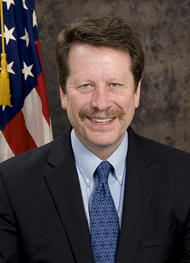Keynote Speaker Bios
 Robert M. Califf, M.D., MACC
Robert M. Califf, M.D., MACC
Commissioner
U.S. Food and Drug Administration
Dr. Califf is the U.S. Food and Drug Administration’s (FDA) Commissioner of Food and Drugs. As the top official of the FDA, Dr. Califf is committed to strengthening programs and policies that enable the agency to carry out its mission to protect and promote the public health. Previously, Dr. Califf served as the FDA’s Deputy Commissioner for Medical Products and Tobacco from February 2015 until his appointment as Commissioner in February 2016. In that capacity, he provided executive leadership to the Center for Drug Evaluation and Research, the Center for Biologics Evaluation and Research, the Center for Devices and Radiological Health, and the Center for Tobacco Products. He also oversaw the Office of Special Medical Programs and provided direction for cross-cutting clinical, scientific, and regulatory initiatives, including precision medicine, combination products, orphan drugs, pediatric therapeutics, and the advisory committee system.
Prior to joining the FDA, Dr. Califf was a Professor of Medicine and Vice Chancellor for Clinical and Translational Research at Duke University. He also served as Director of the Duke Translational Medicine Institute and Founding Director of the Duke Clinical Research Institute. A nationally and internationally recognized expert in cardiovascular medicine, health outcomes research, health care quality, and clinical research, Dr. Califf has led many landmark clinical trials and is one of the most frequently cited authors in biomedical science, with more than 1,200 publications in the peer-reviewed literature.
Dr. Califf has served on the Institute of Medicine (IOM) committees that recommended Medicare coverage of clinical trials and the removal of ephedra from the market, as well as on the IOM Committee on Identifying and Preventing Medication Errors and the IOM Health Sciences Policy Board. He has served as a member of the FDA Cardiorenal Advisory Panel and FDA Science Board’s Subcommittee on Science and Technology. Dr. Califf has also served on the Board of Scientific Counselors for the National Institutes of Health and the National Library of Medicine, as well as on advisory committees for the National Cancer Institute, the National Heart, Lung, and Blood Institute, the National Institute of Environmental Health Sciences and the Council of the National Institute on Aging.
While at Duke, Dr. Califf led major initiatives aimed at improving methods and infrastructure for clinical research, including the Clinical Trials Transformation Initiative (CTTI), a public-private partnership co-founded by the FDA and Duke. He also served as the principal investigator for Duke’s Clinical and Translational Science Award and the NIH Health Care Systems Research Collaboratory Coordinating Center.
Dr. Califf is a graduate of Duke University School of Medicine. He completed a residency in internal medicine at the University of California, San Francisco, and a fellowship in cardiology at Duke.
 Francis S. Collins, M.D., Ph.D.
Francis S. Collins, M.D., Ph.D.
Director
National Institutes of Health
Dr. Collins is the Director of the National Institutes of Health (NIH). In that role he oversees the work of the largest supporter of biomedical research in the world, spanning the spectrum from basic to clinical research.
Dr. Collins is a physician-geneticist noted for his landmark discoveries of disease genes and his leadership of the international Human Genome Project, which culminated in April 2003 with the completion of a finished sequence of the human DNA instruction book. He served as Director of the National Human Genome Research Institute at NIH from 1993 to 2008.
Before coming to NIH, Dr. Collins was a Howard Hughes Medical Institute investigator at the University of Michigan. He is an elected member of the Institute of Medicine and the National Academy of Sciences, was awarded the Presidential Medal of Freedom in November 2007, and received the National Medal of Science in 2009.

Harold E. Varmus, M.D.
Professor of Medicine, Lewis Thomas University Professor of Medicine
Weill Cornell Medicine
Senior Associate
New York Genome Center
Dr. Varmus is a trained physician who began his scientific career as a member of the U.S. Public Health Service at the National Institutes of Health in the late 1960s, working on gene regulation in bacteria with Ira Pastan. He then spent 23 years at the University of California Medical School in San Francisco, working in extensive partnership with J. Michael Bishop on the biology of retroviruses, including the mechanism of viral DNA synthesis and integration, gene expression, viral entry, and oncogenesis in vivo and in vitro. As a result of this work, Dr. Varmus with Dr. Bishop received the 1989 Nobel Prize for Physiology or Medicine.
Dr. Varmus has assumed a number of significant administrative roles including serving as Director of the NIH from 1993 to 1999, as President of Memorial Sloan Kettering Cancer Center from 2000 to 2010, and as Director of the National Cancer Institute from 2010 to 2015. He currently serves as the Lewis Thomas University Professor at Weill Cornell Medicine and a Senior Associate Member of the New York Genome Center.
In addition to his research and teaching responsibilities, Dr. Varmus serves as a consultant to academic institutions, foundations, and companies, developing new means to share their findings through enhanced publication processes, including public digital libraries, open access journals, and pre-print servers, and working with several colleagues on projects to repair lesions in the research enterprise.

Chris H. Wiggins, Ph.D.
Chief Data Scientist
The New York Times
Dr. Wiggins was recently appointed to The New York Times as Chief Data Scientist. He is also an Associate Professor of Applied Mathematics at Columbia University and a founding member of Columbia’s Center for Computational Biology and Bioinformatics (C2B2). Prior to joining the faculty at Columbia, he was a Courant Instructor at New York University and earned his Ph.D. degree at Princeton University. Since 2001 he has also held appointments as a visiting scientist at Institut Curie (Paris), Hahn-Meitner Institut (Berlin), and Kavli Institute for Theoretical Physics (Santa Barbara). At Columbia, he serves as the faculty advisor for the Society of Industrial and Applied Mathematics as well as the Application Development Initiative. He is a founding member of the Institute for Data Sciences and Engineering (IDSE), serving on the Executive Committee and the Entrepreneurship Committee, and as Advisor to the Education Committee in forming the IDSE Curriculum and a Certificate program. His research focuses on applications of machine learning to real-world data. This includes inference, analysis, and organization of naturally occurring networks; statistical inference applied to time-series data; applications of information theory and optimization in biological networks; and large-scale sequence informatics in computational biology.
John Wilbanks
Chief Commons Officer
Sage Bionetworks
Mr. Wilbanks is the Chief Commons Officer at Sage Bionetworks, where he leads the governance group. He is also a Senior Fellow at FasterCures. Sage Bionetworks addresses the real-world impacts of widespread data reuse in cloud-based “open science.” The company was instrumental in building open methods for informed consent for more than 200,000 participants engaged in clinical trials.
Mr. Wilbanks has been a TEDGlobal talk presenter on the subject of informed consent. He also is the co-founder of the Access to Research campaign, which resulted in Federal policy requiring public acess to scientific research across the U.S. Government.
In prior positions, Mr. Wilbanks worked at Harvard’s Berkman Klein Center for Internet & Society, the World Wide Web Consortium, the U.S. House of Representatives, Creative Commons (hosted at MIT’s Project on Mathematics and Computation), and the Ewing Marion Kauffman Foundation. He co-founded a bioinformatics company called Incellico, which was acquired by Selventa in 2003.

